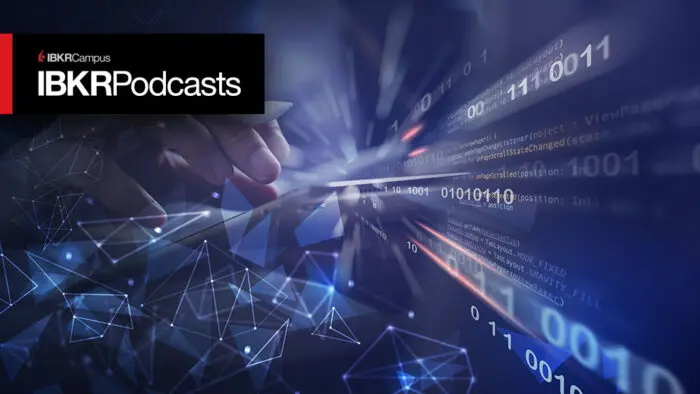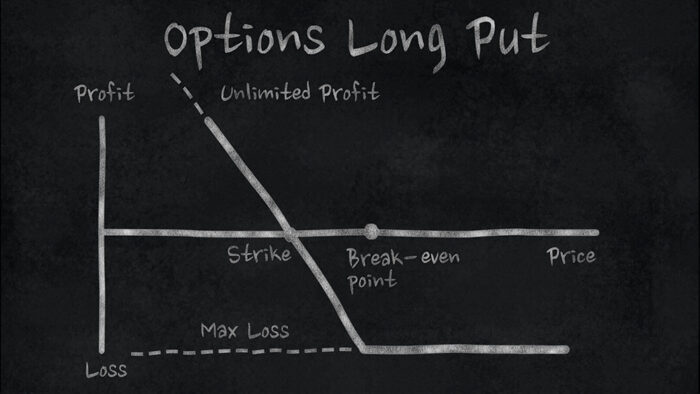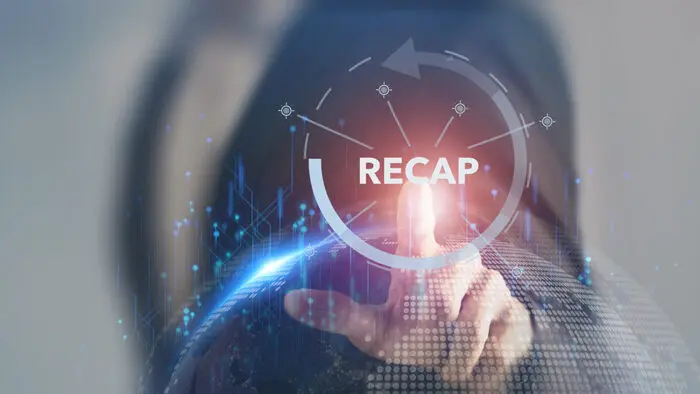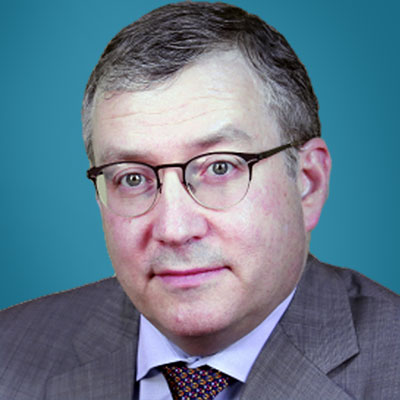IBKR’s Steve Sosnick hosts Lewis Johnson, CIO at Capital Wealth Advisors, to discuss how to utilize economic and commodities cycles for profitable investment strategies.
Summary – Traders’ Insight Radio Ep. 12: Everything is Cyclical
The following is a summary of a live audio recording and may contain errors in spelling or grammar. Although IBKR has edited for clarity no material changes have been made.
Steve Sosnick
Hi everybody, this is Steve Sosnick. Welcome to Interactive Brokers, Traders’ Insight Radio. We are taping this podcast today on February 23rd.
My guest today is Lewis Johnson, and I will let Lewis introduce himself and his firm for all of you.
Lewis Johnson
Oh, hi Steve.
So, thanks again for having us on it’s really an honor, we appreciate it. So again, my name is Lewis Johnson. I’m the Chief Investment Officer and a partner here at Capital Wealth Advisors and it’s kind of a full-service investment advisory business headquartered in Naples, FL. We have about 50 team members. And we built that business organically over the last nine or ten years on the investment side.
SS
You know one of the things I’d really like you to inform the listeners about is when you and I talked, I was amazed at how you’ve grown this firm organically. I’m going to say relatively from the ground up here, and I think that a lot of the listeners would enjoy hearing the path that you took and where you made the right choices and if there are any choices you regret.
LJ
Well, when we when we talk as a group of partners, we can always list very quickly the painful mistakes we made along the way.
What I’ve tried to do is just bring my kind of investment perspective. Being in the markets for more than 20 years I’ve made my share of mistakes and that has kind of informed the way we try to talk to clients.
I can share with you some quick personal story. Basically, my father was killed in a car accident which could have devastated my family financially, but we had a financial advisor who was a family friend. He cared about us. He made good decisions on behalf of my mother, and so the small amount of money that we had for insurance paid my way to college.
My mother got to keep our family home and you know it made a difference that we had competent people that cared. That were that were working to help our personal financials and so that was an experience that’s never been far from my heart, and I don’t think it’s far from the hearts of all our team members when we think about trying to work on behalf of our clients.
SS
I’m certainly sorry to hear about your family personal tragedy. I think we’re all informed in our investment philosophies or investment styles about the path we’ve taken up to this point, and your firm’s been in business for 18 years. You’ve been in the business for over 20. Tell us a little bit more about how you arrived where you are today, the path that you took and how that informs your style and your choices that you make on behalf of your clients.
LJ
Well, sure.
I got out of Wharton, my first full time job in the investment business was with T. Rowe Price down in Baltimore, and so I guess I thought it was a lot of money that they’re managing. At the time it was $300 billion and now it’s something like $1.6 trillion.
SS
Wow.
LJ
I know those numbers are so crazy, but it was just a wonderful place to learn Steve, because I came out and had a lot of drive. I really wanted to kind of perfect my craft on the investment side. And just in terms of a place really to learn, you really couldn’t beat it. I had the chance to work with some wonderful people and because you’re working with thoughtful professionals who all had decades in the business themselves, who had their own framework. It was a wonderful way to kind of organically find what kind of investor you were. What you’re thinking points were, and so forth.
So, one of the things that that I think I took from that former experience and took in as my kind of analytical career was just the need to really think about trade structure. So, we think a lot about investing in solutions. We take a look and say “Well, what are the problems society needs to solve to progress as group” and then we like to focus our kind of investment in research efforts within that because I think society proceeds by profitable solving of important problems, and so that’s how we want to participate on behalf of our investors.
SS
Yet you raise a very important point, and I think that’s lost on a lot of investors, and one of the things that you said was one of your bigger takeaways was trade structure and I think that gets lost on a lot of investors. Smaller investors don’t necessarily need to sweat it as much, but I think people fail to appreciate liquidity risk as being out there — and this is not a matter of being gloomy or downbeat, but it is a risk, and it has a way of sneaking up on you at absolutely the worst time. And it’s interesting to hear that that was something you and the team at T. Rowe actively considered when you were structuring your portfolios or your position.
LJ
Well, definitely. That’s where I got my spurs in the investing business and then I had the good fortune to work with a lot of other very talented professionals in time, a couple of different New York based hedge funds. And one of the things that became very clear to me, Steve, at least in my career, was that in an ideal world you’d have perfect timing. You’d sell at the top. You’d buy at the bottom. Nobody does that.
SS
Only liars
LJ
That’s true. We joke around the office that even though we’re not clairvoyant, there is always room on our analytical team for people that can see the future. And so, if anybody out in the listening audience is in fact clairvoyant, please send me your email, because I’m always looking for people that can see the future.
But failing that, you really have to think about this idea of trade structure, because trade structure is the one thing that you really can control. Basically, the only thing you really can control is your entry price and then everything else is something that that happens to you. And so, either you can have perfect timing or you can think about trade structure and that really goes into the position thinking as well as the portfolio construction. It’s a frequent conversation I’ve had with clients that if everything in your portfolio is going up and down at the same time, that’s not diversified.
SS
Yeah, I’ve been having this discussion, sort of with our readership on Traders’ Insight and in the media because I get the question a lot about what makes a hedge. As someone who was an option trader for most of his career, hedging is not necessarily just done with derivatives, it’s done by structure, it’s done by finding assets that are decorrelated or poorly correlated or less volatile with more volatile.
You know the question I get a lot is “Is crypto a hedge?”, which I won’t take you down the rabbit hole, but my short answer is no because it’s increasingly correlated with other risk assets. But it does bring us back to the commodity sector because I will say that particularly in the current environment, commodities are a hedge.
Gold actually has been an out performer and you’ve got some expensive extensive experience investing in both commodities and trading commodities and commodity stocks. Tell me how that’s informing your work in in this current environment.
LJ
Now, well that’s a great question Steve because I can tell you that really is how we begin kind of everyday, or the kind of long-term investment journey the clients are on when you’re risking hard-earned money in the market. Which is how to get from where we are to a better future, and so you’re correct. I kind of began my analytical career in the cyclical commodity equity related businesses that were really the first emerging markets boom that began in ’02. And I kind of continued that in working for a very well-known commodity trading company. That’s where I began my formal collaboration with our Director of Research, Seth Abraham, and so we’ve really devoted quite a bit of time in our career to that.
And I think it’s a wonderful place for people to invest. It was a wonderful place to learn the business because what you what you see quite quickly is what people willingly pay for a business or the environment in which that business operates changed much more quickly than the actual business itself, and so it really makes it inescapable for you to understand that everything is cyclical. And you need to kind of know where you are in that cycle and what are driving those things. So, if you if you take a step back and look big picture at commodities, we have a very bullish multiyear outlook on commodities.
For instance, you were just talking about gold. I mean gold is the same price it was ten years ago, and it has a long correlation of having a very — excuse me– a long period of time with having very little correlation with the equity market. And frankly, not to get down the rabbit hole, but gold and a lot of gold related assets have a very useful function in times when valuations are high, and right now they’re very historically high in equities. Gold tends to do exceptionally well when equity valuations are high and kind of normalizing, and so that really has been like a long area of focus, and it’s definitely represented in our clients’ portfolios now.
That is one thing to start the commodity argument about the other side as well. It’s been my experience that all of the real secular bull markets in commodities begin and end with gold for one reason and one reason only. If you think back to your microeconomics class, Micro 101. The long-term price of a commodity is equal to, if you remember, its marginal cost of production and so basically you cannot have a secular bull market in the price of a commodity unless you have a bull market in the marginal cost to make that commodity. And that’s gold, right? Because gold does a very good job over time of reflecting changing currency values within it. So, at this point when you take a look at how we are trying to take advantage of that market opportunity in commodities, very meaningful kind of gold related positions.
Also, in the agricultural sector where I spent quite a bit of time. Let’s take the publicly traded fertilizer companies, where they’re selling valuable inputs into to farmers who are trying to increase their yields. And for instance, of course, LNG liquefied natural gas, frankly, is exceptionally well positioned with the geopolitical issues in terms of Russians running tanks into the Ukraine. Well, that’s 40% of German natural gas supplies that probably need to come from somewhere else, and that’s I don’t even know how many.
SS
That’s a big shift. Oh yeah, it’s enormous.
LJ
I don’t even know how many trillions of dollars that’s going to take. I’m going to guess it’s a lot and it’s probably going to take eight or ten years to fix, even if it’s a Marshall Plan type scale rollout. So, that gets back to again, profitably investing in solutions. I’d actually go one further in terms of why we do have this positive multiyear outlook on commodities. It’s that it’s an area that’s been starved of investments and frankly there’s some– I was just reading this morning something from McKinsey Global Institute that was talking about the zero-carbon goal that so much the world is focused on at this point, and it put a price tag of 275 trillion dollars to meet zero emissions by 2050.That’s just so much money that money has not been spent yet.
SS
No, it’s not there.
LJ
No, but it shows the scope of money that’s going to need to be deployed if that goal is going to be met. And then the second thing of course, where I think this is going to create an opportunity, was yesterday Blackstone came out, if I recall it correctly, and said that on their private equity they’re not going to be investing in fossil fuels anymore. Well, I don’t think we have the green energy transition down yet in terms of new supply. So, to cut off supply before you have your alternative supply is kind of a recipe for markedly higher prices and a lot of instability. And so, I think we’re entering a period like that and that should be higher prices and that of course, is the basis of, what’s the saying? Today’s high prices are the cure for…
SS
High prices are the cure for high prices.
Now we’re taping this on a day where I believe wheat and soybeans both hit multiyear highs in Chicago and going back to your point, which I agree with, about the margin. You know the long-term price is around the price of marginal cost of production.
It doesn’t strike me that the marginal cost of production of those commodities has gone up markedly in the past couple of weeks and they’re responding to short term supply and demand concerns. How much of it do you feel is a monetary phenomenon going back to Macro 101? You know where it’s too much money chasing of too few goods and how much of that do you feel this is something that is within the Fed’s purview versus we’re just going to have to roll with this?
LJ
No, that’s a great question. Let’s try to unpack that on kind of two levels. I mean 1st in terms of macro; I think you’re definitely correct. We use the gold price as a good long-term proxy for the value of currencies and one way to think about it is gold fundamentals can’t really change. The world changes around it, so golds like a mirror that reflects the world.
SS
I like that.
LJ
So, when the when the gold price doubles. Gold didn’t do anything; it’s just the value of currencies fell in half. I mean, that’s what happened.
SS
I look at it as the anti-dollar, but that’s a more nuanced way of viewing it. I appreciate that.
LJ
Well yeah. One of the things that in a conversation I’ve had with clients very frequently is, that gold’s been around before there was a dollar. Gold will be around after there’s a dollar, so the big gold bull markets are when it’s kind of outperforming everything. Stock markets, different currencies, so I try not to get too fixated on the dollar itself. It tends to be a kind of a global phenomenon, at least in the in the big gold bull markets. So, but that kind of gets back to what we said earlier. We definitely have a very constructive multiyear outlook, and we’re expressing that right now in a concentrated way in precious metals, in gold, because we really believe that’s where this is going to start for reasons we outline.
Now, one other comment I would make this on a micro level, in terms of these higher crop prices that you’re seeing right now. Remember that’s another way to think about too, but there could be a very rational reason let’s say for those higher crop prices. If the world, let’s say X, Ukraine now or X, Russia needs to bring on more wheat supply because Russia and Ukraine are very meaningful wheat exporters, then we’re going to have to expand capacity in the western world to meet that.
And so that means you’re going to have to use more marginal lands, and you’re going to have to bid that land away from other higher price crops. So, a big part of what happens in that shift in the supply and demand cycle is the aggregate level of demand rising, and so you’re having to bring in higher cost acres for instance.
And so, I think it’s probably a combination of both of those, but I think you have your finger on a very important phenomenon, which is that these cycles tend to be ubiquitous in in nature. The rising tide tends to lift a lot of boats, although I will tell you that right now, we do have a pretty meaningful concern that the Chinese property market, which we’ve been talking about for good six or nine months is impaired on a multiyear basis due to the draconian credit controls that are there now which are now leading to falling units and weakening economics.
So, the last cycle was China driven. Very much China industrial commodities driven. I do think this is going to be a broad-based cycle but how we’re adjusting the market right now is different in terms of heavy agriculture, energy based in terms, let’s say LNG, US natural gas, precious metals. We’re not so heavy in the industrial metals for those reasons I outlined.
SS
It’s an interesting phenomenon, and I think the China situation has gotten overlooked because I — I’m going to make the analogy here that the China real estate bubble is sort of analogous to the Japanese real estate bubble of the late 80s. which by the way did not end well either for the world or…
LJ
I agree totally.
SS
Which by the way did not end well either for the world or for Japan. And yet at the same time, I think China had been a force for deep global deflation, the globalization aspect of it. Basically, they were this bid for commodities and just raw material inputs that they needed which will probably slow somewhat if they’re not building houses all the time and have to work through this backlog. Yet at the same time, we’ve got, I’m going to say diminishing returns from globalization. I think COVID is making businesses rethink their supply chains and issues of that nature.
Do you feel that this could meaningfully impact inflationary trends just at the time where we’re where we’re really starting to see them stick their heads up? We won’t get that benefit from reduced labor costs in other countries.
LJ
Well, you know that’s a really good question. I mean, it’s one of the things that we do wrestle with, because, again, I do firmly believe that without gold you can’t have a an honest to God, multiyear bull market in in commodities. But you know when we when we look at that, I’d say a couple of things. First of all, it’s very easy now for people, look back in retrospect and look at China driving a global commodity bull market.
But I remember when I was in that seat as an analyst at T. Rowe in ‘02 and ’03 and we were accumulating a multibillion-dollar position in the commodity complex commodity companies. There had never been a China drifting commodity cycle, right?
I mean everybody thought of the ‘70s because that was that was the last analog. So just because the last one was in fact China driven doesn’t mean the next one has to be China driven. We had a gold driven commodity bull market in the ‘70s where there was in fact no China. And so, I definitely think that these things may rhyme, but they don’t repeat, they are different. Every bull market is kind of different in its in its own way, but we definitely have one eye on China, and I can tell you my concerns about that go back a long time, even back in 2012.
I went over to China for a whole week in April of 2012. We spent a week going all over the country, kind of working on one issue and one issue only which was the China shadow banking system because I had a deep concern that it looked very much like the US shadow banking system. That was the credit accelerator for the US housing bubble, which we were able to kind of identify and navigate. And when I went over there 10 years ago, all the pieces were in place and then ten years went by. You know, and the problems got bigger.
SS
I think central banks have a have a way of being able to wallpaper over the problems, but eventually they do reveal themselves and that is my sort of existential fear. That is, what’s going on in China now is the result of that and what we may be looking ahead to some of the volatility that we’re reckoning with here in the US, which predates the Russia-Ukraine cycle. I want to add I do think that some of it is, the Fed having papered over a lot of the issues to keep the economy on a solid track after COVID.
LJ
You know, if there’s one point I would interject, I guess is inflation’s very powerful and very insidious. And I guess the good news about inflation is that in 15 minutes of looking at the situation, you can understand why there is inflation. I can tell you that one of the things that was very helpful for me for me in navigating the financial crisis was understanding that credit is different from inflation.
Credit is debt that somebody believes they’re going to get paid back. It’s a serious obligation and when you have a boom in obligations, that’s really kind of robbing from the future. And if you take a look to your point, I mean there are many sins I think our central bankers have committed. You know, printing of money and so forth unquestionably have been bad. I would a argue frankly the most pernicious that people do not yet understand is the scope of our future that we’ve mortgaged to debt obligations based on today’s favorable view on asset prices. That was exactly what happened to Japan.
SS
Yeah, and that is a huge problem, especially when you consider that one man’s liability is another’s asset. And if that asset becomes impaired, that is deflation and we’re walking a big tightrope, you know. Do we keep a system where we pay back the debts with inflated currency or devalued currency? Or do we let the debts resolve themselves, which is deflationary in and of itself. So, it’s not a scintillating prospect either way, if you’re a central banker.
LJ
Yeah, I mean we think a lot about these issues as a as a research team. Behind closed doors we agitate or wave our arms and debate it, but I can tell you that I guess if I my framework on this — we’ll see if it ends up being the right one — is that an over-indebted world it’s very difficult for the central banks to kind of raise sustainably the real cost of money, because that’s an enormous tax. And I think that one of the things that that may end up driving gold, if this framework is correct, is taking away this kind of false belief that the Fed can go out and raise rates or that any of these central bankers can because in my view, they’re not in charge anymore because frankly, when they created this enormous pile of debt over the last five decades, the pile of debt is in charge. Not them.
SS
Well, there’s the old saying if I owe a million dollars to the bank and I can’t pay it back, I’m ruined. If I owe a billion dollars to the bank and I can’t pay it back, the bank is ruined.
LJ
That’s correct.
SS
And that’s really what you’re talking about writ large. Which brings us back into it, ’cause we’ve alluded to some of the historical precedents and you mentioned getting started just as the tech bubble was deflating and having weathered the global financial crisis of the 2008 era mortgage crisis.
Let’s dig a little deeper into some of the parallels and with great appreciation to your recognition that history doesn’t always repeat, but it certainly rhymes. What are some of the parallels that you see being relevant in the current climate and what else do you think is not something we should be as concerned with now as we were then?
LJ
You know that’s a great question. So let me think where to start, so I suppose we started this conversation, Steve. Everything is cyclical, even the things that people don’t yet understand were cyclical that they’re going to find out or cyclical, and so that’s the framework that I’ve kind of grown up with, and I’m too old of a dog to change that view. So, one thing that rhymes, one of the major cycles that we’ve studied is called the Kuznets infrastructure cycles named for Simon Kuznets. It’s every 16 to 20 years. He won a Nobel Prize for his insights back in the ‘30s studying cycles. And that’s essentially a real estate infrastructure cycle. And so, if you look back at some of the major financial catastrophes that have shaken the world or shaped the world.
So, let’s start with, say, ‘87 – ‘89 in Japan, and that was arguably one of the biggest real estate bubbles in in history. So, you add 16 or 20 years to that, and you get 2005, 2006. It’s in the US now. OK, and so that was the housing bubble that was a defining moment for many people. So, you add 15 to 20 years for that, and you go to China and look at that. Isn’t that amazing?
15 to 20 years and now it’s in China because, you know? So, that’s the periodicity’s and frankly, if you went back and you studied that, you would see that one of those cycles has taken place with pretty reliable periodicity all the way back to 1907. So that’s kind of one of the things that informs our framework is what are in Don Rumsfeld’s wonderful framework of the known unknowns?
SS
I use this all the time. The known unknowns versus the unknown unknowns.
LJ
Oh yeah, the unknown unknowns are the ones.
SS
Those are the truly exogenous. The rogue waves as they were.
LJ
Yeah, and frankly we should talk about that in a minute, but I think one of the known unknowns is that you have these real estate cycles. They take place every other business cycle and they sneak up on people because for many people maybe 15 years as their career in the business.
Which is one of the reasons that I love to study history because it kind of gives you an edge in my opinion about studying past times. And so, that’s why I was kind of focused on the issue in China even in 2012. And so now at large frankly, I think it’s a real challenge that they’re going to have to deal with and that informs how we how we think about investing.
LJ
So, I do think that there is a real risk of a highly overvalued real estate bubble that’s breaking in in China. You know, we don’t really have any participation in that sector. We’re watching with some concern. So, to me that’s a little… And that of course is what drove the financial crisis because it was the fact that highly levered financial companies had mortgages as collateral. And to your point, the homeowner’s liability was the bank’s asset. And when those got compromised it compromised the health of the financial system, which is what led to the financial crisis. So, we’ll see how dark things get for the Chinese authorities. I think they’re going to be wrestling those alligators for a while.
And then you if you step back and you think more broadly, I do look at this market and it does feel a little bit like the run up into the tech cycle. You know, new and interesting technologies that captivate particularly young investors who don’t have the arrows sticking out of them that I have after doing this for a while and very easy to be enthusiastic about a graphics card.
SS
I think a lot of it is youthful enthusiasm. To be fair, that’s who drove the Internet. They were the early adopters of the Internet and they saw it, and I think younger people because they don’t have the arrows in them are a bit more willing to take the risk, and I think many of them see the same future in blockchain that I will admit I don’t. I know it’s out there; I know has a multitude of uses, but we can argue whether or not a lot of the new technologies that are that are cropping up.
You know, crypto being just one use of blockchain and along with NFTs. Are they really going to be the uses that we look back in 20 years and say those are the killer apps for those technologies?
LJ
Well, no, that’s true and of course everybody, I think correctly so points back to, let’s say Amazon. And of course, I had the great fortune to meet Jeff Bezos in February of 2000, I think it was. He came to Wharton, and he spoke. And of course, he’s an immensely talented entrepreneur, and everything that he’s accomplished, butt Amazon did fall 92% during that decline. And of course it was amazing technology and it did go on to conquer the world but there was that little intervening 92% decline along the way.
And you do have to manage through. I keep telling our analytical team, don’t go to the end of the movie. You’ve got to live each scene. You can’t just go to the end.
SS
I love that.
You know what I I’m noticing here? We’ve tried to keep these to about half an hour. You and I’ve been going for at least 1/2 an hour and we could probably go another half an hour. But I want to sort of guide us toward a conclusion, but you and I have gotten a bit gloomy at times here.
I want to end on a happy note.
LJ
Yeah, I know. Well look, let me take a step back. Well, I mean I can tell you that I couldn’t be more excited about the markets for me personally, because remember, I mean, I cut my teeth in this business. Going to Brazil in 2002 and touring iron ore mines or going to China in February of 2003? I mean, I was a strange dude going to strange places and it was fun, you know?
Because what I really like Steve is I like change, and the world is demonstrably changing right now, and so that may be a challenging time for the markets, but I think if you’ve got a team that that is thoughtfully doing honest to God, real research, and is not afraid to put their money where their mouth is and to look different from the market and of course message that. Then change is great, you know. I mean, there’s a wonderful quote from Napoleon, who said that “Revolution is a is a great time for soldiers of courage.”
And right? Cause he went to be corporal to the emperor, and he could not have made that happen if there weren’t bombs going off and strange times. So, we frankly, you know, welcome a very different world than what we’ve what we’ve been in. We think that’s what we try to offer for clients in terms of our research, so it may be a different world, but I think I’m really excited about getting to work. And I think there’s always a bull market somewhere if there’s if there’s only one thing I’ve learned.
SS
That’s very true.
LJ
No, but that’s the thing. It might be 10,000 miles away, other side of the world, and it always starts very small. I mean remember Apple, before it became Apple, was flat for 20 years. Apple had no forward progress from 1983 until 2003, and so if you would have told people in 2003 that Apple was going to be the size it is, people would have laughed at you.
So, it started small, and it became real. The next cycle I think will be just like that. And one thing that gets us out of bed and into work in the morning every day is to find that next big thing ’cause it’s out there.
SS
Wow. I couldn’t have written a better coda to this discussion. Lewis, this this was a true pleasure. For those of you who’ve been listening all along I hope you learned as much as I did through my conversation today with Lewis Johnson of Capital Wealth Advisors. Again, you’re listening to Interactive Brokers Traders’ Insight Radio.
We appreciate your listening. We’ll have this podcast along with many others available on our site and on major platforms. And once again, many thanks to our guest. I truly enjoyed your perspective and your ability to balance risk and reward, and to be continually looking forward and I only wish you the best for you and your customers.
LJ
Well thank you Steve. It’s a real pleasure to be here. Thank you for having us.
SS
My pleasure, talk to everybody soon, take care.
Disclosure: Interactive Brokers
The analysis in this material is provided for information only and is not and should not be construed as an offer to sell or the solicitation of an offer to buy any security. To the extent that this material discusses general market activity, industry or sector trends or other broad-based economic or political conditions, it should not be construed as research or investment advice. To the extent that it includes references to specific securities, commodities, currencies, or other instruments, those references do not constitute a recommendation by IBKR to buy, sell or hold such investments. This material does not and is not intended to take into account the particular financial conditions, investment objectives or requirements of individual customers. Before acting on this material, you should consider whether it is suitable for your particular circumstances and, as necessary, seek professional advice.
The views and opinions expressed herein are those of the author and do not necessarily reflect the views of Interactive Brokers, its affiliates, or its employees.
Disclosure: Futures Trading
Futures are not suitable for all investors. The amount you may lose may be greater than your initial investment. Before trading futures, please read the CFTC Risk Disclosure. A copy and additional information are available at ibkr.com.



















